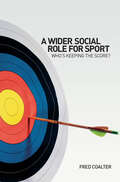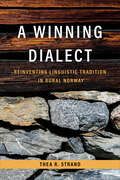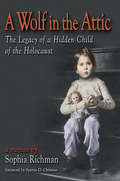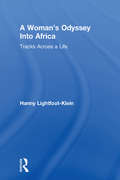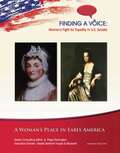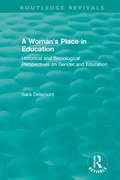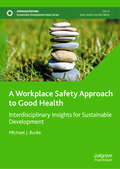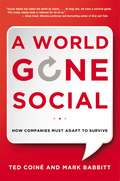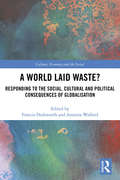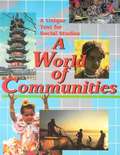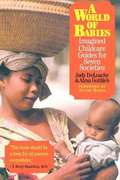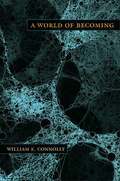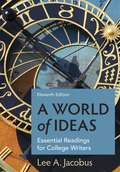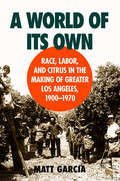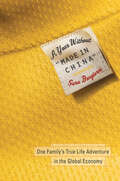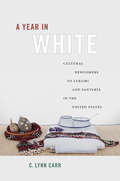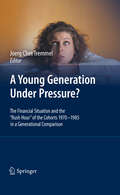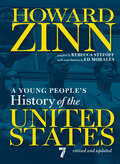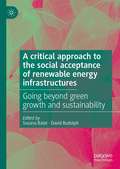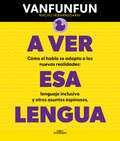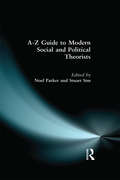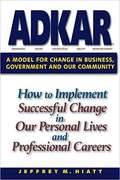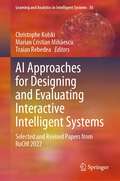- Table View
- List View
A Wider Social Role for Sport: Who's Keeping the Score?
by Fred CoalterSport is perceived to have the potential to alleviate a variety of social problems and generally to ‘improve’ both individuals and the communities in which they live. Sport is promoted as a relatively cost effective antidote to a range of social problems – often those stemming from social exclusion - including poor health, high crime levels, drug abuse and persistent youth offending, educational under-achievement, lack of social cohesion and community identity and economic decline. To this end, there is increasing governmental interest in what has become known as ‘sport for good’. A Wider Social Role for Sport presents the political and historical context for this increased government interest in sport’s potential contribution to a range of social problems. The book explores the particular social problems that governments seek to address through sport, and examines the nature and extent of the evidence for sport’s positive role. It illustrates that, in an era of evidence-based policy-making, the cumulative evidence base for many of these claims is relatively weak, in part because such research is faced with substantial methodological problems in isolating the precise contribution of sport in many contexts. Drawing on worldwide research, A Wider Social Role for Sport explores the current state of knowledge and understanding of the presumed impacts of sport and suggests that we need to adopt a different approach to research and evaluation if sports researchers are to develop their understanding and make a substantial contribution to sports policy..
A Winning Dialect: Reinventing Linguistic Tradition in Rural Norway (Teaching Culture: UTP Ethnographies for the Classroom)
by Thea R. StrandWhy did a rural dialect from the heart of Norwegian farm country win a national dialect popularity contest? What were the effects of this win, and what has happened to the winning dialect since? A Winning Dialect tells a story of linguistic and cultural transformation in the rural district of Valdres, Norway. It shows how lifelong residents have adapted to changing social, economic, and political circumstances – particularly the shift from family farming to tourism development – and how they have used local linguistic and cultural resources to craft a viable future for themselves and the places their ancestors have called home for centuries. Once stigmatized as poor and uneducated, the distinctive dialect of Valdres now holds a special place as a valuable part of Norwegian national heritage, as well as a marker of local belonging. Based on two decades of research and fieldwork, A Winning Dialect considers how a traditional dialect is transformed – linguistically and culturally – as it is put to new uses in the contemporary world.
A Wolf in the Attic: The Legacy of a Hidden Child of the Holocaust
by Sophia RichmanA Wolf in the Attic: Even though she was only two, the little girl knew she must never go into the attic. Strange noises came from there. Mama said there was a wolf upstairs, a hungry, dangerous wolf . . . but the truth was far more dangerous than that. Much too dangerous to tell a Jewish child marked for death. One cannot mourn what one doesn&’t acknowledge, and one cannot heal if one does not mourn . . . A Wolf in the Attic is a powerful memoir written by a psychoanalyst who was a hidden child in Poland during World War II. Her story, in addition to its immediate impact, illustrates her struggle to come to terms with the powerful yet sometimes subtle impact of childhood trauma.In the author's words: “As a very young child I experienced the Holocaust in a way that made it almost impossible to integrate and make sense of the experience. For me, there was no life before the war, no secure early childhood to hold in mind, no context in which to place what was happening to me and around me. The Holocaust was in the air that I breathed daily for the first four years of my life. I took it in deeply without awareness or critical judgment. I ingested it with the milk I drank from my mother&’s breast. It had the taste of fear and despair.”Born during the Holocaust in what was once a part of Poland, Sophia Richman spent her early years in hiding in a small village near Lwów, the city where she was born. Hidden in plain sight, both she and her mother passed as Christian Poles. Later, her father, who escaped from a concentration camp, found them and hid in their attic until the liberation.The story of the miraculous survival of this Jewish family is only the beginning of their long journey out of the Holocaust. The war years are followed by migration and displacement as the refugees search for a new homeland. They move from Ukraine to Poland to France and eventually settle in America. A Wolf in the Attic traces the effects of the author&’s experiences on her role as an American teen, a wife, a mother, and eventually, a psychoanalyst. A Wolf in the Attic explores the impact of early childhood trauma on the author&’s: education career choices attitudes toward therapy, both as patient and therapist social interactions love/family relationships parenting style and decisions regarding her daughter religious orientationRepeatedly told by her parents that she was too young to remember the war years, Sophia spent much of her life trying to ”remember to forget” what she did indeed remember. A Wolf in the Attic follows her life as she gradually becomes able to reclaim her past, to understand its impact on her life and the choices she has made, and finally, to heal a part of herself that she had been so long taught to deny.
A Woman's Odyssey Into Africa: Tracks Across a Life
by Ellen Cole Esther D Rothblum Hanny Lightfoot KleinHere is the intriguing story of one woman’s mid-life flight from her stultified, middle-class, psychologically crippling, and unfulfilled existence into a world of high adventure, danger, hardship, and endurance, which ultimately leads her to autonomy and recognition. In her new book, A Woman’s Odyssey Into Africa, Hanny Lightfoot-Klein chronicles three year-long solo backpacking treks through remote areas of sub-Saharan Africa. In the process, she discovers the mainsprings of strength within herself as she follows her own drummer, finding the courage to face the darkest and most secret convolutions of her own mind. She weaves the story of her journey through the men, women, and children she meets, and the dangers and adventures she faces as a lone woman traveler--part and parcel of the path she has chosen to take.She infuses readers at any stage of life, especially women, with the courage to do what their individual drummer dictates, as she did, to find fulfillment in life. Lightfoot-Klein assures readers in her book: “Even a life of quiet desperation is not beyond redemption. Change starts with a reassessment of the distortions in self image one has been programmed to accept. It starts with an inner rebellion, a realization that something has been amiss and a desire to set it right, if only to leave a better heritage for one’s children. And then, most important of all, it begins with a single, wild, breathless moment, where one picks up an unaccustomed load and steps off into the unknown . . . ” Her message is truly for everyone.
A Woman's Place in Early America (Finding a Voice: Women's Fight for Equal)
by Leeanne GelletlyIn early America, married women had no rights under law. They belonged to their husbands. Their voices were not heard in public. But with the War of Independence, women found a voice as patriots. They supported the rebellion with boycotts. During wartime, women spied on the enemy. They served as messengers. They tended the wounded. Some even served as soldiers. Women performed daring feats of bravery. And they proved they were capable of doing much more than 18-century society allowed them. Some women called for change. Abigail Adams asked that the laws of the new nation recognize legal and educational rights for women. Judith Sargent Murray called for educational reform. It would take several more decades before women took up the cause for their legal, educational, and political rights. But leaders of the movement would be able to look to 18th-century American women for inspiration.
A Woman's Place in Education: Historical and Sociological Perspectives on Gender and Education (Routledge Revivals)
by Sara DelamontPublished in 1996, this volume includes the presidential address of Sara Delamont, the first female President of Bera written and presented in 1984. The book also includes a selection of papers on gender and education. Topics covered include: female pupils’ experiences, resistance to sex equality messages, science education for girls and women in universities. Providing historical and sociological perspectives on gender and education this book will interest sociologists, anthropologists, and those in the field of education. This book was originally published as part of the Cardiff Papers in Qualitative Research series edited by Paul Atkinson, Sara Delamont and Amanda Coffey. The series publishes original sociological research that reflects the tradition of qualitative and ethnographic inquiry developed at Cardiff. The series includes monographs reporting on empirical research, edited collections focussing on particular themes, and texts discussing methodological developments and issues.
A Workplace Safety Approach to Good Health: Interdisciplinary Insights for Sustainable Development (Sustainable Development Goals Series)
by Michael J. BurkeThis book presents the latest behavioral research findings on workplace safety to assist practitioners and policymakers in achieving and maintaining good health for all workers. It delves into a wide range of topics such as experiential learning, individual and team safety training, safety climate, and safety leadership to discuss how to achieve specific targets associated with the United Nations Sustainable Development Goal of Good Health and Well-Being (SDG 3). A distinctive feature is the thorough coverage of safety research findings applicable to organizations in high-income and low- to middle-income countries, where work-related accidents, diseases, and mortality rates are often considerably higher. A timely reflection on the global applicability of advances in behavioral safety research, this book is a useful source for practitioners, policymakers, graduate students, and researchers alike in management, occupational safety, occupational health psychology, and various fields in engineering, public health, and medicine.
A World Gone Social: How Companies Must Adapt to Survive
by Ted Coiné Mark BabbittThe Social Revolution's impact on the business world cannot be over-estimated. Like the meteor that likely precipitated the end of the dinosaurs, Social is the catalyst in an extinction event--and business as we know it has changed forever. A World Gone Social offers an eye-opening look at fundamental and powerful changes the social collaboration era has set in motion: Customers now have the power--just watch what happens as more realize it! With increased transparency, businesses must be more ethical--no more pretending Command-and-control leadership is now so inefficient, it is a liability Nimble and small is the new competitive advantage--few corporations are capable of the agility required by evolving marketplaces Recruiting is now a two-way proposition, with job seekers able to peer behind the corporate curtain Relationship and community-building is how customers and brand ambassadors are won--and retained Engagement--with partners, employees, and customers--is not a luxury; it is a requirement. Each chapter provides compelling stories and concrete examples of companies demonstrating enlightened business practices and doing Social right--and some that are not--and the lessons to be learned from their experiences. Finally, readers will discover how to objectively assess the fit ness of their own company's culture and social presence. . . so they may successfully transition from a 20th- to a 21st-century "social" organization.
A World Laid Waste?: Responding to the Social, Cultural and Political Consequences of Globalisation (CRESC)
by Francis Dodsworth Antonia WalfordGlobalisation and neo-liberalism have seen the rise of new international powers, increasingly interlinked economies, and mass urbanisation. The internet, mobile communications and mass migration have transformed lives around the planet. For some, this has been positive and liberating, but it has also been destructive of settled communities and ways of living, ecologies, economies and livelihoods, cultural values, political programmes and identities. This edited volume uses the concept of waste to explore and critique the destructive impact of globalisation and neo-liberalism. By bringing to bear the distinct perspectives of sociologists of class, religion and culture; anthropologists concerned with infrastructures, material waste and energy; and analysts from accounting and finance exploring financialization and supply chains, this collection explores how creative responses to the wastelands of globalisation can establish alternative, at times fragile, narratives of hope. Responding to the tendency in contemporary public and academic discourse to resort to a language of the ‘laid to waste’ or ‘left behind’ to make sense of social and cultural change, the authors of this volume focus on the practices and rhetorics of waste in a range of different empirical settings to reveal the spaces for political action and social imagination that are emerging even in times of polarisation, uncertainty and disillusionment. This inter-disciplinary approach, developed through a decade of research in the ESRC Centre for Research on Socio-Cultural Change (CRESC), provides a distinctive perspective on the ways in which people in very different social and cultural contexts are negotiating the destructive and creative possibilities of recent political and economic change.
A World Of Communities
by Marcia S. GreskoA World of Communities is designed to meet the most common curriculum standards for elementary students in world history, geography, and economics. The text and activity book integrate numerous skill-building elements in the areas of mapreading and geographical literacy, interpretation of visual information, understanding and appreciating literature, multicultural and tolerance studies, history, and reading strategies. Key themes and concepts include: Understanding the physical world around usUnderstanding the relationship between topography and how people live and work Understanding what a community is and how it functions Understanding and appreciating different communities Understanding and appreciating different cultures Understanding and appreciating individuals as part of a larger culture Comparing other cultures and communities to one's own Understanding how cooperation and conflict affect people Chapters include: Chapter 1: INDIA (Bombay) Chapter 2: CHINA (Guangzhou) Chapter 3: RUSSIA (Moscow) Chapter 4: SOUTH AFRICA (Johannesburg) Chapter 5: ISRAEL (Jerusalem) Chapter 6: ENGLAND (London) Chapter 7: PUERTO RICO (San Juan) Chapter 8: ST. VINCENT and the Grenadines
A World of Babies
by Alma Gottlieb Deloache Judy S.Are babies divine, or do they have the devil in them? Should parents talk to their infants, or is it a waste of time? Answers to questions about the nature and nurture of infants appear in this book as advice to parents in seven world societies. Imagine what Dr Spock might have written if he were a healer from Bali … or an Aboriginal grandmother from the Australian desert … or a diviner from a rural village in West Africa. As the seven childcare 'manuals' in this book reveal, experts worldwide offer intriguingly different advice to new parents. The creative format of this book brings alive a rich fund of ethnographic knowledge, vividly illustrating a simple but powerful truth: there exist many models of babyhood, each shaped by deeply held values and widely varying cultural contexts. After reading this book, you will never again view child rearing as a matter of 'common sense'.
A World of Babies: Imagined Childcare Guides for Seven Societies
by Judy Deloache Alma GottleibThis book is a study in child care among different cultures. The authors of the various chapters are fictitious, with fictional biographies, but the information they contain is carefully researched nonfiction. It is designed as a learning tool for how different cultures view child care, rather than a how to manual.
A World of Becoming
by William E. ConnollyIn A World of Becoming William E. Connolly outlines a political philosophy suited to a world whose powers of creative evolution include and exceed the human estate. This is a world composed of multiple interacting systems, including those of climate change, biological evolution, economic practices, and geological formations. Such open systems, set on different temporal registers of stability and instability, periodically resonate together to produce profound, unpredictable changes. To engage such a world reflectively is to feel pressure to alter established practices of politics, ethics, and spirituality. In pursuing such a course, Connolly draws inspiration from philosophers such as Maurice Merleau-Ponty, Alfred North Whitehead, and Gilles Deleuze, as well as the complexity theorist of biology Stuart Kauffman and the theologian Catherine Keller. Attunement to a world of becoming, Connolly argues, may help us address dangerous resonances between global finance capital, cross-regional religious resentments, neoconservative ideology, and the 24-hour mass media. Coming to terms with subliminal changes in the contemporary experience of time that challenge traditional images can help us grasp how these movements have arisen and perhaps even inspire creative counter-movements. The book closes with the chapter "The Theorist and the Seer," in which Connolly draws insights from early Greek ideas of the Seer and a Jerry Lewis film, The Nutty Professor, to inform the theory enterprise today.
A World of Gangs: Armed Young Men and Gangsta Culture (Globalization and Community #14)
by John M. Hagedorn&“Street gangs mirror the inhuman ambitions and greed of society&’s trendsetters and deities even as they fight to the death over scraps from the table of the international drug trade. But John Hagedorn, characteristically, also finds hope in the contradictory values of outlaw youth—selflessness, solidarity, and love amid cupidity and directionless rage—and he maintains the hope that a culture of resistance will ultimately prevail over the forces of self-destruction. Whether one shares his optimism or not, he makes a compelling case that the future of the world will be determined on the streets of our cities.&” —Mike Davis, from the Foreword &“A World of Gangs is an illuminating journey around the cultures, lives, tragedies, and dreams of millions of rebellious youth around the planet. It is an indispensable work to understand the world we live in and essential reading for students of cities and communities.&” —Manuel Castells For the more than a billion people who now live in urban slums, gangs are ubiquitous features of daily life. Though still most closely associated with American cities, gangs are an entrenched, worldwide phenomenon that play a significant role in a wide range of activities, from drug dealing to extortion to religious and political violence. In A World of Gangs, John Hagedorn explores this international proliferation of the urban gang as a consequence of the ravages of globalization. Looking closely at gang formation in three world cities-Chicago, Rio de Janeiro, and Capetown-he discovers that some gangs have institutionalized as a strategy to confront a hopeless cycle of poverty, racism, and oppression. In particular, Hagedorn reveals, the nihilistic appeal of gangsta rap and its street ethic of survival &“by any means necessary&” provides vital insights into the ideology and persistence of gangs around the world. This groundbreaking work concludes on a hopeful note. Proposing ways in which gangs might be encouraged to overcome their violent tendencies, Hagedorn appeals to community leaders to use the urgency, outrage, and resistance common to both gang life and hip-hop in order to bring gangs into broader movements for social justice. John M. Hagedorn is associate professor of criminal justice at the University of Illinois, Chicago. He is editor of Gangs in the Global City and author of the highly influential People and Folks: Gangs, Crime, and the Underclass in a Rustbelt City. MacArthur fellow Mike Davis is the author of many books, including Planet of Slums and, most recently, Buda&’s Wagon: A Brief History of the Car Bomb.
A World of Ideas: Essential Readings for College Writers
by Lee A. JacobusThe book engages students with the big ideas that have shaped society and are reshaping it today. Readings by essential authors -help students trace the origins of central cultural concepts and respond to them. A World of Ideas asks such crucial questions as, What defines good government? What forces shape our society? What does it mean to be educated? The text helps students respond to these questions by providing the guidance they need to understand, analyze, and write. Substantial, supportive apparatus helps students focus on both the content of the readings as well as the rhetorical moves that writers use to achieve their purposes, providing instruction and models as students join in the important conversations continuing today. New chapters on Education and Gender, and new readings throughout, speak to today's urgent concerns. Improved writing instruction includes more scaffolding and examples that provide greater support for students.
A World of Its Own
by Matt GarciaTracing the history of intercultural struggle and cooperation in the citrus belt of Greater Los Angeles, Matt Garcia explores the social and cultural forces that helped make the city the expansive and diverse metropolis that it is today.As the citrus-growing regions of the San Gabriel and Pomona Valleys in eastern Los Angeles County expanded during the early twentieth century, the agricultural industry there developed along segregated lines, primarily between white landowners and Mexican and Asian laborers. Initially, these communities were sharply divided. But Los Angeles, unlike other agricultural regions, saw important opportunities for intercultural exchange develop around the arts and within multiethnic community groups. Whether fostered in such informal settings as dance halls and theaters or in such formal organizations as the Intercultural Council of Claremont or the Southern California Unity Leagues, these interethnic encounters formed the basis for political cooperation to address labor discrimination and solve problems of residential and educational segregation. Though intercultural collaborations were not always successful, Garcia argues that they constitute an important chapter not only in Southern California's social and cultural development but also in the larger history of American race relations.
A Year Without "Made in China": One Family's True Life Adventure in the Global Economy
by Sara BongiorniCan an American family live without Chinese-made goods? &“A wry look at the ingenuity it takes to shun the planet&’s fastest-growing economy.&” —Bloomberg News &“Journalist Bongiorni, on a post-Christmas day mired deep in plastic toys and electronics equipment, makes up her mind to live for a year without buying any products made in China, a decision spurred less by notions of idealism or fair trade—though she does note troubling statistics on job loss and trade deficits—than simply &‘to see if it can be done.&’ In this more personal vein, Bongiorni tells often funny, occasionally humiliating stories centering around her difficulty procuring sneakers, sunglasses, DVD players and toys for two young children and a skeptical husband . . . Bongiorni is a graceful, self-deprecating writer, and her comic adventures in self-imposed inconvenience cast an interesting sideways glance at the personal effects of globalism.&” —Publishers Weekly
A Year in White
by C. Lynn CarrIn the Afro-Cuban Lukumi religious tradition--more commonly known in the United States as Santería--entrants into the priesthood undergo an extraordinary fifty-three-week initiation period. During this time, these novices--called iyawo--endure a host of prohibitions, including most notably wearing exclusively white clothing. In A Year in White, sociologist C. Lynn Carr, who underwent this initiation herself, opens a window on this remarkable year-long religious transformation. In her intimate investigation of the "year in white," Carr draws on fifty-two in-depth interviews with other participants, an online survey of nearly two hundred others, and almost a decade of her own ethnographic fieldwork, gathering stories that allow us to see how cultural newcomers and natives thought, felt, and acted with regard to their initiation. She documents how, during the iyawo year, the ritual slowly transforms the initiate's identity. For the first three months, for instance, the iyawo may not use a mirror, even to shave, and must eat all meals while seated on a mat on the floor using only a spoon and their own set of dishes. During the entire year, the iyawo loses their name and is simply addressed as "iyawo" by family and friends. Carr also shows that this year-long religious ritual--which is carried out even as the iyawo goes about daily life--offers new insight into religion in general, suggesting that the sacred is not separable from the profane and indeed that religion shares an ongoing dynamic relationship with the realities of everyday life. Religious expression happens at home, on the streets, at work and school. Offering insight not only into Santería but also into religion more generally, A Year in White makes an important contribution to our understanding of complex, dynamic religious landscapes in multicultural, pluralist societies and how they inhabit our daily lives.
A Young Generation Under Pressure?: The Financial Situation and the "Rush Hour" of the Cohorts 1970 - 1985 in a Generational Comparison
by Joerg TremmelJustice between generations is still not as prominent on any agenda as justice between rich and poor or men and women. For the first time, this three-part book explores the situation of young people of today in comparison to their direct predecessors. The first part, The Financial Situation of the Young Generation in a Generational Comparison, deals with this generation's financial standing; the second part, The Rush Hour of Life, examines their time restrictions. Both are considered from a life-course perspective. The third part, On the Path to Gerontocracy?, addresses the demographic shift in favor of the elderly in aging Western democracies.
A Young People's History of the United States: Revised and Updated (For Young People Series)
by Howard ZinnA Young People's History of the United States brings to US history the viewpoints of workers, enslaved people, immigrants, women, Black people, Latino Americans, Asian Americans, American Indians, and others whose stories, and their impact, are rarely included in books for young people. Beginning with a look at Christopher Columbus&’s arrival through the eyes of the Arawak Indians, then leading the reader through the struggles for workers&’ rights, women&’s rights, and civil rights during the nineteenth and twentieth centuries, and ending with the current protests against continued American imperialism, Zinn presents a radical new way of understanding America&’s history. In so doing, he reminds readers that America&’s true greatness is shaped by our dissident voices, not our military generals.A Young People's History of the United States is also a companion volume to The People Speak, the film adapted from A People's History of the United States and Voices of a People&’s History of the United States.
A critical approach to the social acceptance of renewable energy infrastructures: Going beyond green growth and sustainability
by Susana Batel David RudolphThis book provides a critical approach to research on the social acceptance of renewable energy infrastructures and on energy transitions in general by questioning prevalent principles and proposing specific research pathways and lines of inquiry that look beyond depoliticised, business-as-usual discourses and research agendas on green growth and sustainability. It brings together authors from different socio-geographical and disciplinary backgrounds within the social sciences to reflect upon, discuss and advance what we propose to be five cornerstones of a critical approach: overcoming individualism and socio-cognitivism; repoliticisations – recognising and articulating power relations; for interdisciplinarity; interventions – praxis and political engagement with research; and overcoming localism and spatial determinism: As such, this book offers academics, students and practitioners alike a comprehensive perspective of what it means to be critical when inquiring into the social acceptance of renewable energy and associated infrastructures.
A ver esa lengua: Cómo el habla se adapta a las nuevas realidades: lenguaje inclusivo y otros asuntos espinosos
by VanfunfunUsando palabras sencillas y argumentos de perroflauta punki de la lengua, defendidos por la lingüística más actual, este influencer de YouTube va a cambiar tu percepción de cómo se habla. ¡Hola! ¿Sabías que hablar mal es imposible? ¿Que la RAE no tiene la razón en muchas ocasiones? ¿Que el lenguaje inclusivo es bueno? ¿Que çe pue eccribî en andalû y no se acaba el mundo? ¿Y que, de hecho, la gente joven no está arruinando la lengua?
A-Z Guide to Modern Social and Political Theorists
by Noel Parker Professor Stuart SimThe A-Z Guide to Modern Social and Political Theories is a companion volume to the already published A-Z Guide to Modern Literary and Cultural Theorists. It ranges widely through the social sciences and related areas to identify thinkers who have had a major impact on the development of modern social and political theory and given clear, accessible summaries of their work. While the accent is on the later twentieth century, several up-and-coming theorists are included to ensure a contemporary edge to the volume, classic names in the field from the earlier twentieth century are not neglected, and the collection also delves back into the nineteenth century for such founding figures of the social sciences as Marx and Comte. The volume is therefore both up-to-date and mindful of the sources of modern debates.
ADKAR: A Model for Change in Business, Government and our Community First Edition
by Jeffrey M. HiattAfter research, the ADKAR model has emerged as a holistic approach that brings together the collection of change management work into a simple, results oriented model. This model ties together all aspects of change management including readiness assessments, sponsorship, communications, coaching, training and resistance management. ADKAR is a simple and holistic way to manage change.
AI Approaches for Designing and Evaluating Interactive Intelligent Systems: Selected and Revised Papers from RoCHI 2022 (Learning and Analytics in Intelligent Systems #36)
by Christophe Kolski Traian Rebedea Marian Cristian MihăescuDesigning, building, and evaluating Interactive and Intelligent Systems (IIS) has highly impacted the progress of Artificial Intelligence (AI) techniques due to advancements in the fields of Deep Learning (DL) and Natural Language Processing (NLP). This book presents in a structured way several practical use cases of the interplay between IIS and DL/NLP, from cognitive assistants, adaptive navigation systems, virtual reality, offensive comment and cyberbullying detection, 3D modelling, and driving behaviour detection. The convergence of AI and Human-Computer Interaction (HCI) has been proven to foster the IIS development that nowadays represents the most used context by actively integrating AI techniques in merely any layer of modern applications.The main goal of this book is to provide a practical reference with a rich set of approaches and applications consisting of selected and revised papers from the International Conference on Human-Computer Interaction (RoCHI) 2022 thatwas held on 6-7 October 2022 at the University of Craiova, Romania. The book addresses researchers and practitioners with experience in IIS and AI (mainly DL and NLP) who want to study successfully developed workflows and applications that may be useful in their attempts to tackle issues from their contexts.Although the book nicely integrates concepts from various areas, each chapter may be considered a standalone topic with its research issue, proposed approach, experimental results, and discussions.
